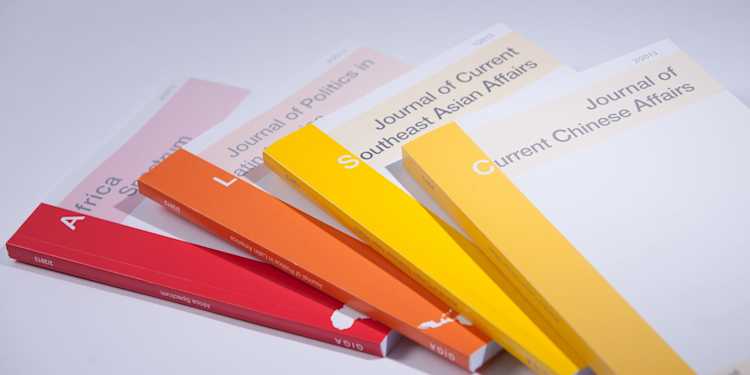GIGA Journal Family | 20/04/2015
Africa Spectrum Celebrates Its Fiftieth Anniversary
The GIGA’s Africa Spectrum journal is one of the ten best area studies journals.
Africa Spectrum, Vol 50, No 1 (2015) Africa Spectrum at 50: Reaching such an age is in itself an achievement for any academic journal, given the uncertainties involved regarding finding continuous funding and being able to rely on the personal commitment of those who “make” the journal: the editors, publishers and not least the editorial assistants and copyeditors – the backbone of a complex machinery. But age in itself may not be a merit. We’re not satisfied that we’ve managed to “hang on” – rather, we take pride in the progress our journal has made in terms of quality and international recognition. We think this anniversary justifies a short retrospective.
From a German enterprise to an international journal
Africa Spectrum was launched in 1966 (as Afrika Spectrum) under the guidance of its first editor, Martin Krämer, who retained his post until 1969. At that time, it was mostly a German enterprise, in terms of both ownership and authorship. Until 1971, exclusively issues with one particular thematic focus were produced, the first entitled “The New States of Africa: Botswana and Lesotho” (translated here from the original German). Among these early issues, just one was published in English (Vol. 3/1969: “Law in East Africa”). Starting in the 1970s, the language policy became increasingly permissive, and the journal began to include articles not only in English but also in French.
Over time, Afrika Spectrum’s publisher underwent various changes in terms of its name and juridical status; certain political and policy shifts were behind this. The dominance of economic and geographic topics in the early years of the journal’s publication was a manifestation of the strong influence of the business community within the German Institute of African Studies in Hamburg. The institution was only later federated under the roof of the German Overseas Institute, providing space for greater autonomy and, as a result, more thematic diversity. One outstanding and continuous feature, however, has been the interdisciplinary orientation of the journal, including a section on continent-wide legal developments (a phenomenon which might seem somewhat exotic from today’s perspective). In fact, well into the 1980s the journal included North Africa but gradually came to concentrate on Africa south of the Sahara. We are planning to honour the strides made during the initial years by including a commissioned article on the journal’s development over time, set to be published in this year’s final issue.
The heads behind the journal
While in the early years the editorship of the journal frequently changed hands, a heightened continuity of leadership at the top started with Harald Voss (1976–1991), who was succeeded by another long-term editor-in-chief, Dirk Kohnert (1991–2008). This cohesiveness was to the benefit of the journal, which was able to develop a more distinctive profile. Kohnert managed to get Afrika Spectrum accepted into the Social Sciences Citation Index in 2006. The journal’s link with the [German African Studies Association] was institutionalized. The last major modification took place in 2009, when the journal became “all-English” (and consequently adjusted its name, becoming Africa Spectrum) and turned fully open access (no author fees, all articles free of charge). Dirk Kohnert had already operated with an editorial team of devoted colleagues who served as the disciplinary guardians of quality. Those of us currently in charge expanded this idea by recruiting internationally renowned scholars into our editorial group. With this issue, we warmly welcome Gordon Crawford (University of Leeds) to our ranks.
Top ten in journal ranking
Last year’s Journal Citation Report (by Thomson Reuters) ranked us among the top ten journals in the area studies category (rank 9, reflecting the citation status in 2013) and as third among all African Studies journals – a first for us on both accounts. Without the commitment of our international advisory board, our objective and constructive reviewers, our colleagues on the editorial team and institute staff plus – last but not least – our competent authors and keen readers, we wouldn’t have made it this far. Maintaining those achievements is an arduous task for a noncommercial journal, one that has also managed to publish all issues in recent years on schedule with no delay. We will do our best to continue to serve our readers and the global African Studies community and hope in return for your continued loyal support. Such recognition is the ultimate encouragement and reward.
Editorial by Andreas Mehler and Henning Melber

GIGA Journal Family
The GIGA Journal Family is presided over by Sage, maintaining the “platinum standard” of the Open Access model. Contributions by leading researchers from all over the world feature in our four journals. To ensure their quality, all submissions are evaluated in a double-blind peer-review process.
GIGA Journal Family